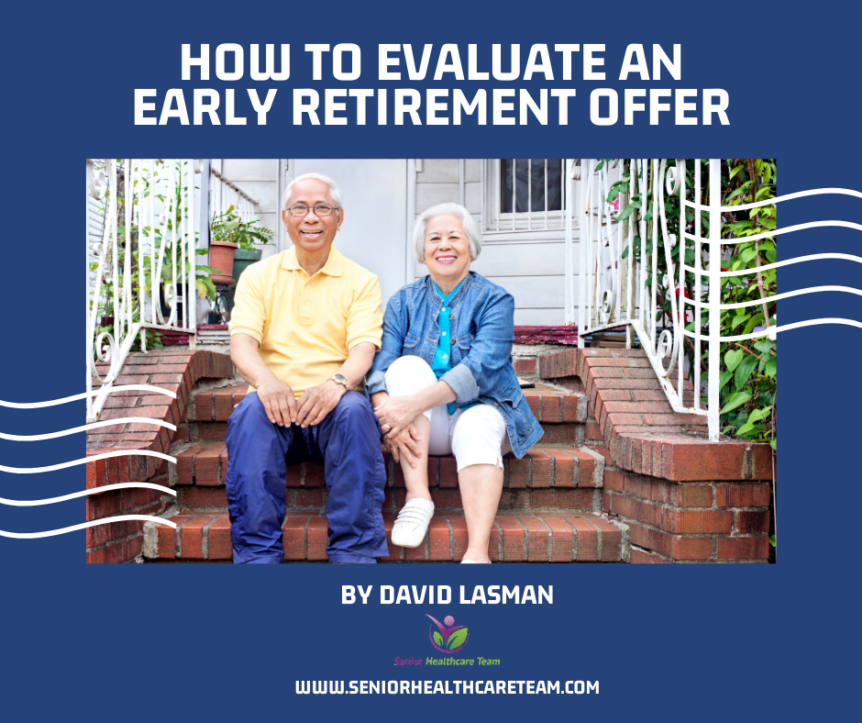Consider your personal and financial needs before accepting an early retirement package.
As companies navigate the pandemic and its associated risks, some employers are offering early retirement packages to reduce the number of paid employees. If your employer asks you to consider an early retirement incentive, carefully consider the terms of the package. A retirement package can be that final multiplier that greatly increases the probability of a successful retirement, or [it] can be a misstep that derails well thought out planning.
When considering an early retirement package you’ll want to think about:
- The specifics of what’s included in the package.
- Health insurance needs.
- Your age and Social Security benefits.
- Your financial situation.
- The possibility of finding another job.
- The consequences of not accepting the offer.
- Use the following criteria to weigh the pros and cons of an early retirement offer.
What Are the Specific Package Features to Review?
Early retirement offers can vary, depending on the company, your number of years as an employee and the organization’s financial position. Start by checking for the following features:
Severance pay: This is an amount that is usually based on your work history. Employers will often offer one or two weeks worth of pay for every year of employment.
Health insurance: The company may end or extend your current health coverage. Consider how long your health insurance will continue.
Pension or retirement benefits: Look to see if you will receive early access to your pension or bridge clauses to fill the gap between your early retirement and the onset of Social Security benefits.
Additional services: The package might include life insurance, assistance with finding another job or financial services to help you with your retirement planning.
Be sure to read through the details of the package. You will need to closely inspect the offer you are given. These types of offers have existed for a long time, but the surge we are seeing now could easily change the structures and benefits in these plans. Diligence is key.
Consider Your Health Insurance Needs

If you are 65 or older, you are probably eligible for Medicare. If you are younger than 65, you’ll want to find out if health insurance benefits are part of the retirement package. If the employer does provide limited-term health insurance, you should evaluate how long the insurance covers you for, what it covers and what alternatives are available to you once the coverage ends.
For packages without any health insurance options, consider how you will obtain health insurance. Perhaps your spouse has a plan that will cover you. You may need to purchase health insurance yourself, which could be expensive. The cost of independent health insurance plans can be high and may not even be available if you have certain pre-existing conditions.
Factor in Social Security Benefits
Social Security benefits are available starting at age 62. Younger retirees typically won’t be eligible for Social Security benefits. If you are able to start receiving Social Security payments, it’s worthwhile to consider the implications of starting Social Security benefits early. Taking benefits before you reach your full retirement age will reduce the monthly payments you receive. For example, if you sign up for Social Security at age 62 and your full retirement age is 66, you can expect to receive a 25% lower monthly benefit compared to waiting until you turn 66 to start collecting payments.
Look at Your Financial Situation
Consider how an early retirement would affect your retirement finances. Good planning is done early and often, and having retirement thrust upon you sooner than you expected can definitely throw some wrenches into your plans. Go over your overall savings, along with expected income streams, such as money from a rental property, pension or other investments. Then look at the expenses you will have during retirement to see if you will be able to retire comfortably now.
Think About Your Well-Being
Consider the type of lifestyle you will have if you retire now. If you have a health condition that would make working longer difficult or have a loved one who is ill, you may opt for the early retirement package so you can focus on these areas. The same is true if you are ready to take a break from working or want to pursue other interests. The number one rule to consider when evaluating these plans is whether or not you are truly ready for retirement.
Examine the Possibility of Finding Another Job
After evaluating the package and your current retirement savings, you may realize that, from a financial aspect, you need to keep working for several years before retiring. Look at other offers before making a decision about the early retirement package. Unless the current work or environment is unbearable, often the current income will be better and possibly more reliable than a new opportunity.
Also consider the likelihood of finding another job. If other companies in your industry are laying off workers or downsizing, it may be difficult to find work in your specific field. Some early retirement packages may include counseling sessions with a job agency to help you look for another position. Other offers might cover the cost of meeting with a wealth advisor to look over your financial situation and plan next steps.
The Consequences of Not Accepting the Offer
Companies trying to reduce their labor force may be financially unstable. If you refuse the early retirement option, you may continue working for your employer, but there is no guarantee that this offer will be made to you again in the future. If your employer is trying to actively reduce costs or is in a bad financial position, they may not be able to keep you on board.
If you’ve spent many years with the company or in the related industry, you might suggest working part-time as a consultant for a period before retiring. You could check if staying on the job for several months or a year is an option. If you are unclear on what to do, reach out to a professional who can help evaluate your situation and the package before making a final decision.
By David Lasman – “Ask Medicare Dave” | President – Senior Healthcare Team
wwww.SeniorHealthcareTeam.com | 866-333-7340
Selecting the right healthcare plan through Medicare can be overwhelming and downright stressful. Senior Healthcare Team is a nationwide resource that provides guidance and support about Medicare to seniors at no cost to them and helps them to choose the most suitable insurance plan tailored to their specific needs and budget. Our goal is to educate and empower our clients to make the best decisions regarding their healthcare and clear up the confusion of Medicare. At Senior Healthcare Team, we aren’t partial to any one insurance company. Our loyalty is to our clients and our mission is to provide them with the best healthcare options at the very lowest cost.

